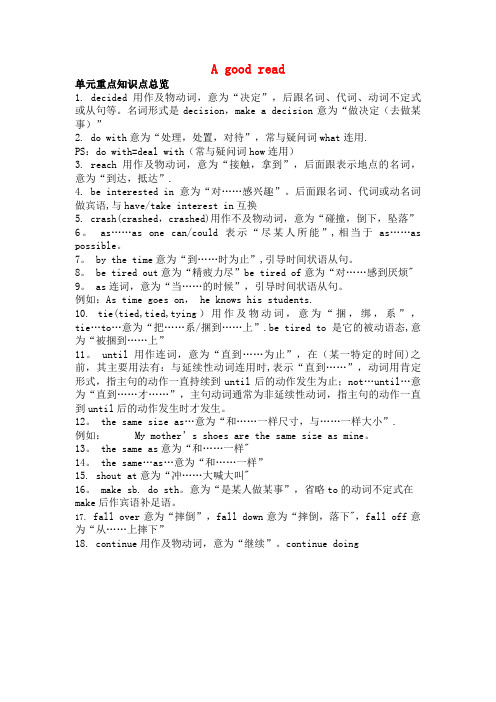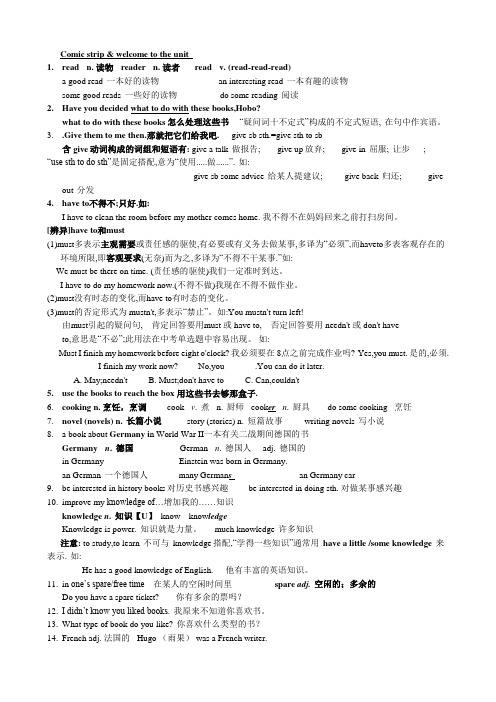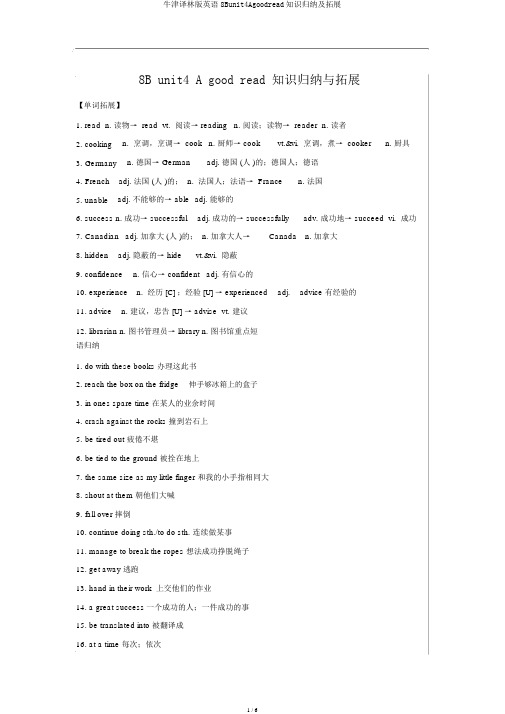牛津译林八年级下册Unit4 A good read 重点知识梳理
- 格式:docx
- 大小:21.51 KB
- 文档页数:6

牛津译林版八年级英语下册Unit4 a good read 课文要点解析Comic strip1.Have you decided what to do with these books, Hobo?霍波,你已决定怎样处理这些书了吗? (教材第48页)I)decide此处用作及物动词,意为“决定”,后跟名词、代词、动词不定式或从句等。
She decided to book two tickets to Hainan online.她决定在网上预订两张去海南的票。
Let's first decide where we should go.咱们先决定应该去什么地方。
[拓展]decide的名词形式是decision,意为“决定”。
make a decision (to do sth. )意为“做决定(做某事)”。
You need to make a decision today.你今天需要做个决定。
中考.链接(2017.江苏苏州).Jack, why have you decided_________Chinese folk music as a course?一To learn more about Chinese culture.A. takeB. takenC. takingD. to take解析:我们可用“固定搭配法”解答此题。
decide to do sth.为固定搭配,意为“决定做某事”,故选D。
句意:“杰克,你为什么决定选择中国民间音乐这门课”“为了更多地了解中国文化。
” 答案:D(2)do with意为“处理;处置;对待”,常与疑问词what连用。
What did you do with those old keyboards?你怎么处理那些旧键盘了?The new teacher didn't know what to do with students.那位新老师不知道如何对待学生。

2021年春天八年级英语下册 Unit 4 A good read知识点归纳 (新版)牛津版8B Unit4 Welcome to the unit1. Have you decided what to do with these books? 你已经决定如何处置这些书了吗? do with = deal with 处置,对付what to do with…… = how to deal with…… 如何处置to use them to reach the box on the fridge 不能不利用它们来够冰箱上的盒子 a book about Germany in World War Ⅱ读一本关于第二次世界战争德国的书4. What type of book do you like? 你喜爱什么类型的书?5. What do you like to read in your spare time? 你空闲时喜爱读什么书? in one’s spare/free time 在某人的空闲时刻里6. I’m interesting in history books. They improve my knowledge of the past. 我对历史书感爱好。
它们提高我的对过去知识的了解。
(1)be interested in 对…感爱好 = have / take interest in sth / doing sth. (2)improve my knowledge of the past 提高我对过去的熟悉(knowledge 知识不可数 n — v know )7. novels by the French writer Victor Hugo 被/ 由法国作家维克多· 雨果写的小说8. The story of the ugly man Quasimodo really touched me . 那个丑人(加西莫多)Quasimodo 的故事实在感动了我。

A good read单元重点知识点总览1. decided用作及物动词,意为“决定”,后跟名词、代词、动词不定式或从句等。
名词形式是decision,make a decision意为“做决定(去做某事)”2. do with意为“处理,处置,对待”,常与疑问词what连用.PS:do with=deal with(常与疑问词how连用)3. reach 用作及物动词,意为“接触,拿到”,后面跟表示地点的名词,意为“到达,抵达”.4. be interested in 意为“对……感兴趣”。
后面跟名词、代词或动名词做宾语,与have/take interest in互换5. crash(crashed,crashed)用作不及物动词,意为“碰撞,倒下,坠落”6。
as……as one can/could表示“尽某人所能”,相当于as……as possible。
7。
by the time意为“到……时为止”,引导时间状语从句。
8。
be tired out意为“精疲力尽”be tired of意为“对……感到厌烦" 9。
as连词,意为“当……的时候”,引导时间状语从句。
例如:As time goes on, he knows his students.10. tie(tied,tied,tying)用作及物动词,意为“捆,绑,系”,tie…to…意为“把……系/捆到……上”.be tired to是它的被动语态,意为“被捆到……上”11。
until用作连词,意为“直到……为止”,在(某一特定的时间)之前,其主要用法有:与延续性动词连用时,表示“直到……”,动词用肯定形式,指主句的动作一直持续到until后的动作发生为止;not…until…意为“直到……才……”,主句动词通常为非延续性动词,指主句的动作一直到until后的动作发生时才发生。
12。
the same size as…意为“和……一样尺寸,与……一样大小”.例如:My mother’s shoes are the same size as mine。

Unit4 A good read知识点讲解Comic strip&Welcome to the unit1. Have you decided what to do with these books? 你已经决定怎样处理这些书了吗?do with意思是:“对付,处理”,相当于及物动词,在特殊疑问句中,do with 与what 搭配使用。
例:What do you do with this problem? 你怎样处理这个问题?拓展:deal with也意为“对付,处理”,用于特殊疑问句中,与how 搭配使用。
例:I don’t know how to deal with the problem. 我不知道怎样处理这个问题。
2. I have to use them to reach the box on the fridge.我得用它们来够冰箱上的书。
1)use sth. to do sth.意思是:“用某物来做某事”,也可用为use sth. for (doing) sth.。
被动语态为:sth. be used to do sth.例:We use computers to play games.= Computers are used to play games. 我们用电脑玩游戏。
2)reach 为及物动词,意为“够到,到达”I’m too short to reach the apple on the tree. 我太矮了,够不着树上的苹果。
3. They improve my knowledge of the past. 它们提高我对过去的认识。
Knowledge是名词,意为“知识,认知,学问”,后可接of的短语作定语或that从句作同位语,表示关于某方面的知识或对某人或某事的了解或理解,此时knowledge前须加定冠词the。
例:He is poor in money, but rich in knowledge. 他贫于金钱,但富于学问。

Comic strip & welcome to the unit1.read n. 读物reader n. 读者read v. (read-read-read)a good read 一本好的读物an interesting read 一本有趣的读物some good reads 一些好的读物do some reading 阅读2.Have you decided what to do with these books,Hobo?what to do with these books怎么处理这些书“疑问词十不定式”构成的不定式短语, 在句中作宾语。
3..Give them to me then.那就把它们给我吧. give sb sth.=give sth to sb含give动词构成的词组和短语有: give a talk 做报告; give up放弃; give in 屈服; 让步; “use sth to do sth”是固定搭配,意为“使用.....做......”. 如:give sb some advice 给某人提建议; give back 归还; give out 分发4.have to不得不;只好.如:I have to clean the room before my mother comes home. 我不得不在妈妈回来之前打扫房间。
[辨异]have to和must(1)must多表示主观需要或责任感的驱使,有必要或有义务去做某事,多译为“必须”,而haveto多表客观存在的环境所限,即客观要求(无奈)而为之,多译为“不得不干某事.”如:We must be there on time. (责任感的驱使)我们一定准时到达。
I have to do my homework now.(不得不做)我现在不得不做作业。
(2)must没有时态的变化,而have to有时态的变化。

8B unit4 A good read 知识归纳与拓展【单词拓展】1. read n. 读物→ read vt. 阅读→ reading n. 阅读;读物→ reader n. 读者2. cooking n. 烹调,烹调→ cook n. 厨师→ cook vt.&vi. 烹调,煮→ cooker n. 厨具3.Germany n. 德国→ German adj. 德国 (人 )的;德国人;德语4.French adj. 法国 (人 )的; n. 法国人;法语→ France n. 法国5. unable adj. 不能够的→ able adj. 能够的6. success n. 成功→ successful adj. 成功的→ successfully adv. 成功地→ succeed vi. 成功7.Canadian adj. 加拿大 (人 )的; n. 加拿大人→Canada n. 加拿大8. hidden adj. 隐蔽的→ hide vt.&vi. 隐蔽9. confidence n. 信心→ confident adj. 有信心的10. experience n. 经历 [C] ;经验 [U] → experienced adj.advice 有经验的11. advice n. 建议,忠告 [U] → advise vt. 建议12.librarian n. 图书管理员→ library n. 图书馆重点短语归纳1. do with these books 办理这此书2. reach the box on the fridge伸手够冰箱上的盒子3.in ones spare time 在某人的业余时间4.crash against the rocks 撞到岩石上5.be tired out 疲倦不堪6.be tied to the ground 被拴在地上7.the same size as my little finger 和我的小手指相同大8.shout at them 朝他们大喊9.fall over 摔倒10.continue doing sth./to do sth. 连续做某事11.manage to break the ropes 想法成功挣脱绳子12.get away 逃跑13.hand in their work 上交他们的作业14.a great success一个成功的人;一件成功的事15.be translated into 被翻译成16.at a time 每次;依次17. return them on time 按它18. look for hidden treasure 找藏的珠宝19. give me a lot of confidence 我多自信20. open up 开;开启;开辟【句型解析】1. After our ship crashed against the rocks, I swam as far as I could. ( P50)原句意:当我的船撞到岩石坏此后,我力往前游。
牛津译林版八年级下册Unit4 A good read1.Have you decide what to do with these book, Hobo?霍波,你已决定怎么处理这些书了吗?“疑问词what + 动词不定式”结构作宾语。
此结构中的疑问词还可以用when, how, which 等。
I did not know how to get away.我不知道如何逃走。
2.I’m interested in history books.我对历史书感兴趣。
be interested in 对...感兴趣I would be interested in examples of others.我对其他几种的例子更有兴趣。
3.After our ship crashed against the rocks, I swam as far as I could.在我们的船撞到礁石损坏之后,我奋力前游。
as far as I could “尽我所能地远”,用的是“as...as...” 结构,far 为副词。
此结构中也可使用形容词。
It is not as difficult as I thought.这没有我想象得那么困难。
4.By the time, I finally felt the land under my feet, I was tired out.等到我终于感觉到我的脚着地,我已经筋疲力尽了。
by the way 等到,到......的时候,在......以前By the time he reached me, he had vanished.在他来到我跟前的时候,完全消失了。
be tired out 疲倦,筋疲力尽The day after the completion of the work, be tired out Jack stumbled back to his hut, he always remind myself.每天的工作完成后,筋疲力尽的杰克跌跌撞撞地回到他那简陋的小屋时,他总是这样提醒自己。
8B un it4 A good read知识归纳与拓展【单词拓展】1. read n.读物宀read vt. 阅读宀reading n.阅读;读物reader n.读者2. cooking n.烹饪,烹调cook n.厨师cook vt.&vi.烹调,煮cooker n.厨具3. Germany n.德国German adj.德国(人)的;德国人;德语4. French adj.法国(人)的;n.法国人;法语宀France n.法国5. unable adj.不能的able adj.能够的6. success n.成功successful adj.成功的successfully adv.成功地succeed vi. 成功7. Canadian adj.加拿大(人)的;n.加拿大人Canada n.加拿大8. hidden adj.隐藏的hide vt.&vi.隐藏9. con fide nee n.信心con fide nt adj. 有信心的10. experienee n.经历[C];经验[U] experieneed adj. advice 有经验的11. advice n.建议,忠告[U] advise vt.建议12. librarian n.图书管理员library n.图书馆重点短语归纳1. do with these books 处理这此书2. reach the box on the fridge 伸手够冰箱上的盒子3. in ones spare time在某人的业余时间4. crash aga inst the rocks 撞至U岩石上5. be tired out筋疲力尽6. be tied to the ground 被拴在地上7. the same size as my little fin ger 禾口我的小手指一样大8. shout at them朝他们大喊9. fall over 摔倒10. continue doing sth./to do sth.继续做某事11. manage to break the ropes设法成功挣脱绳子12. get away 逃跑13. ha nd in their work上交他们的作业14. a great success 一个成功的人;一件成功的事15. be translated into 被翻译成16. at a time每次;依次17. return them on time 按时归还它们18. look for hidden treasure 寻找隐藏的珠宝19. give me a lot of con fide nee 给我许多自信20. open up开创;开启;开辟【句型分析】1. After our ship crashed aga inst the rocks, I swam as far as I could. ( P50)原句意为:当我们的船撞到岩石损坏之后,我奋力往前游。
Unit 4 A good read 好的读物【重点单词】1.read[n.]读物2.decide[v.]决定(1)[n.]decision(2)decide to do sth.决定做某事=make decision to do sth.(3)decide + 从句3.reach[v.]伸手够到;到达,抵达4.cooking[n.]烹饪,烹调5.Germany[n.]德国6.knowledge[n.]知识7.spare[adj.]空闲的;多余的(1)in one’s spare time = in one’s free time8.French[adj.]法国(人)的9.ugly[adj.]丑陋的good-looking10.touch[v.]感动,触动(1)touching令人同情的,感人的,动人的,修饰物(2)touched感激的,受感动的,形容人的主观感受11.crash[v.]碰撞;撞击12.against[prep.]紧靠,碰,撞(1)反对—>for(2)违背;违反(3)以防13.as[conj.]当...时;因为,由于14.rise[v.]上升,升起(1)rise上升;升起;增加。
指日月星辰等升起、潮水上涨、温度上升等(2)raise举起;提升;增加。
主语通常是人15.tie[v.]捆,绑(1)tie...to...把...绑在...上(2)tie sb./sth. up=tie up sb./sth.16.over[prep.]从一边到另一边17.stomach[n.]腹部;胃18.until[conj.]直到...为止19.around[adv.]大约;周围20.continue[v.]继续(1)continue to do sth.(2)continue doing sth.(3)continue with sth.21.either[adv.](否定句中)也(1)too,also,as well22.manage[v.]设法完成;管理(1)manage to do sth.设法做成某事,通过努力成功做到某事(2)try to do sth.尽力做某事,事情不一定做成功23.lift[v.]举起,抬高;提高24.army[n.]大批,大群an army of一大群25.unable[adj.]不能的,不会的(1)be unable to do sth.(2)be able to do sth.26.wonder[v.]想知道,想弄明白,琢磨(1)wonder + 疑问词+ to do(2)(3)wonder if/whether...27.advise[v.]建议,忠告,劝告(1)(2)28.recommend[v.]推荐(1)recommend that(2)(3)recommend sb. for...推荐某人做...(4)recommend sb. as...推荐某人担任(5)(6)29.review[n.]评论30.return[v.]归还31.refuse[v.]拒绝,回绝(1)refuse to do sth.(2)refuse sb. sth.32.success[n.]成功33.translate[v.]翻译(1)translate...into...把...翻译成...(2)34.sales[n.][pl.]销售量35.online[adv.]在线,联网36.sail[v.]航行37.confidence[n.]信心(1)[adj.]confident(2)be/feel confident about...对...充满信心(3)have confidence in...对...有信心(4)lose confidence in...失去信心(5)lack confidence缺乏信心38.experience[n.]经历,经验39.advice[n.]建议,忠告,劝告40.habit[n.]习惯【重点短语】1.do with处理(1)do with通常和what连用(2)deal with通常和how连用2.as + 形容词/副词原级+ as one can尽某人所能地...3.be tired out 筋疲力尽(1)be tired of (doing) sth.对...感到厌烦4.look down低头看,向下看5.the same...as...与...一样...6.7.fall over 摔倒8.try to do sth.努力做某事,尽力做某事9.10.hand in 上交,递交11.and so on ……等等12.on time 准时at times 有时in time及时13.so far 到目前为止14.at a time 每次,依次15.open up 开启;开创;开辟【重点语法】(一)疑问词+动词不定式1.“疑问词+动词不定式”结构在句中的功能(1)作主语,谓语动词用单数形式①什么时候开会是个问题When to have the meeting is a question.(2)作表语①问题在于谁去那里。
牛津译林八年级下册8BUnit4知识梳理知识点一 Comic-Reading 部分单词短语讲解【知识梳理】1. a good read (P48) 一本好读物read①v. 阅读常见搭配:read newspapers/ magazines/ stories/ novels/ playse.g.: If you are interested, you can read the poster.② n. 读物e.g.: The newspaper is a good read.2. I have to use them to reach the box on the fridge. (P48) 我不得不用他们去够冰箱上的盒子。
reachvt. 到达=arrive in/ ate.g.: She will reach/ arrive at the school at 9:00 tomorrow.vt. 够得到e.g.: He tried to pick the apples, but he can’t reach it.3. They improve my knowledge of the past. (P49) 他们增加了我之前的知识。
1). knowledge n. 知识e.g.: Knowledge is power.① v. knowe.g.: Everyone knows that she is not so rich.2) improve v. 提高,改善常见搭配:improve the situation; improve the daily life; improve the skills4. me too. (P49) 我也是。
me too与me either的区别:①口语中说me too, 其意为“我也一样”,主要用于延续前面的肯定信息。
-I like potato chips.我喜欢吃薯条。
8B unit4 A good read 知识梳理【重点短语】1. a charity show 一场慈善演出2 .the host of the charity show 慈善演出的主持人3.be chosen to be the monitor 被选为班长4. practise a lot 多加练习5. be sure 确信,肯定6. only if 除非7. advertise on the internet 在网上登广告8. give out the leaflets 分发传单9. donate money 捐钱10. organize a charity show 组织一场慈善演出11. sell…to…把…卖给…12. raise money 筹钱13. Project Green Hope 绿色希望工程(慈善机构)14.Project Hope 希望工程(慈善机构)15. Save China’s Tigers拯救中国虎(慈善机构)16. Spring Bud Project 春蕾计划(慈善机构)17. return to school(go back to school) 返回学校18. return sth to…(=give sth back to…)把…还给…19. big cats 大型猫科动物20. in poor areas 在贫困地区21. write to …写信给…22. hear from sb=receive a letter from sb 收到…的来信23. free time 空闲时间24.because of…(+名词、代词或动词-ing形式) 因为…25. TV cameras 电视镜头26. watch the show 看演出27.on time 准时28. in time 及时29. introduce sb to…把…介绍给…30. on duty 值日31. at the right time 在适合的时间32.at the same time 同时33. at the beginning of…在…开始时34. at the end of…在…结束时35. the big day 伟大的一天36. keep doing sth 一直做某事37. twenty minutes before the show 演出前20分钟38. get/ go into the theatre 进入剧场39. No time to be nervous any more 没有时间紧张了40. make noise 发出噪音41. become a little bit easier 变得有点容易了42. seem to do sth 似乎43. be over 结束44. a local business 当地企业45. have a lot of support 得到许多支持46. take part in 参加(活动)47. Best wishes 致以最美好的祝愿48. write down 写下,记下49. by mistake 弄错了50. at least 至少51. at most 最多52. It is a big success 真是太成功了53. help pay for their education 帮助支付他们的学费53.set up the stage 搭建舞台55. have a meeting/ hold a meeting 开会56. hold a charity show 举行慈善演出57. arrange work among the students 在学生中安排工作58. organize a play 组织剧本59. donations are welcome 欢迎捐赠60. thank the following for their help and support感谢下列提供我们帮助和支持的人61.on a snowy night 在一个下雪的夜晚62.from now on 从现在开始63.day and night 日日夜夜64.keep silent 保持沉默65.care about 关心【词汇拓展】1.cook v. → cooking (n.) 烹饪2.France n. → French(adj.) 法国(人)的3. write v. → writer(n.) 作家4.sell v. → sales (n.) 销售量[复]5. Canada n. → Canadian (adj.)6.confident adj. → confidence (n.)7. advise v. → advice (n.)8.stomach n. → stomachs (复数)9. able adj. → unable (反义词)10.hide v. → hidden (adj.) 隐藏的11. library n. → librarian (n.) 图书管理员12.class n. → classical(adj.) 古典的【重点句子】1.Have you decided what to do with these books, Hobo?霍波,你已经决定怎样处理这些书了吗?2. After our ship crashed against the rocks, I swam as far as I could.在我们的船触礁之后,我尽可能远地向前游。
3.By the time I finally felt the land under my feet, I was tired out.当我感到陆地在我的脚下时,我已经筋疲力尽了。
4. It moved up over my stomach and neck until it was standing near my face.它在我的肚子和脖子上移动,直到它站在离我的脸很近的地方。
5. I tried to pull one hand free and finally managed to break the ropes.我尽量挣脱一只手,最终设法弄断了绳子。
6. How many books can I borrow at a time?我一次可以借多少本书?7. I also want to travel and have exciting experiences in the future.在将来,我也想去旅行,并且有激动人心的经历。
【重点语法】一、宾语从句宾语从句就是用一个句子来充当宾语,放在谓语动词的后面。
学习宾语从句要注意一下几个问题:①宾语从句的引导词A. 当宾语从句是陈述句时,用that 引导,that 常可省略。
例如:I know that the boy is from Japan.B. 当宾语从句是一般疑问句时,用if 或whether 引导。
例如:I want to know if he will come back tomorrow.C.当宾语从句是特殊疑问句时,用特殊疑问词引导。
例如:He didn’t know when his mother was born.②宾语从句的语序宾语从句一定要用陈述句的语序。
例如:Can you tell me where he stayed last night?③宾语从句的时态当主句是现在时时,从句用所需的任何时态当主句是过去时时,从句用过去时态的某种时态例如:He said he was playing games at that time.二、疑问词+ 动词不定式由两部分构成:疑问词和动词不定式(wh-+to do)。
疑问词部分包括疑问代词who, whom, what, which 和whose 以及疑问副词when, where 和how。
此外,连接词“whether”也适用 . 它主要具有以下几种功能:①当主语例如:When to hold the meeting has not yet been decided.Where tolive is a problem.②当宾语常接在forget, fi out, discuss, decide, tell,teach, know, learn, wonder, remember 等动词之后作宾语例如:We must know what to say at a meeting.He could not tell whom to trust.Do you know how to play bridge?③当表语例如:The problem is where to find the first aid.The question is who to elect.④当名词同位语例如:Tom had no idea which book to read first.The question whether to confess troubled the girl.⑤用于宾语补足语, 双重宾语某些动词后可接“sb.+ 疑问词+ 不定式”构成的双重宾语,这类动词常用的有advise, ask, show, teach, tell 等.三、情态动词①must与have to 的区别情态动词must和have to 都有“必须”的含义,它们的用法如下:must “必须”、“应该”的用法:1.must 表示“必须”、“应该”。
例如:Wemust protect our environment.Everyonemust obey the rule.2. must 的否定形式must not 表示“不应该”、“禁止”、“不准”。
语气比较强烈。
例如:You mustn’t speak like that.You mustn’t be late for school.3. 在回答must 的问句时,肯定形式用must 来回答,但否定形式用needn’t 或don’t have to 来回答。
而不用mustn’t 来回答。
例如:--MustI be home before 8 o’clock?--Yes,you must. /No, you needn’t./No, you don’t have to.4.have to表示“必须”、“不得不”.例如:He hasto stay in bed for 3 or 4 days.We will have to get up early tomorrow.5.must 表示的是说话人的主观看法,而have to则表示的是客观需要。